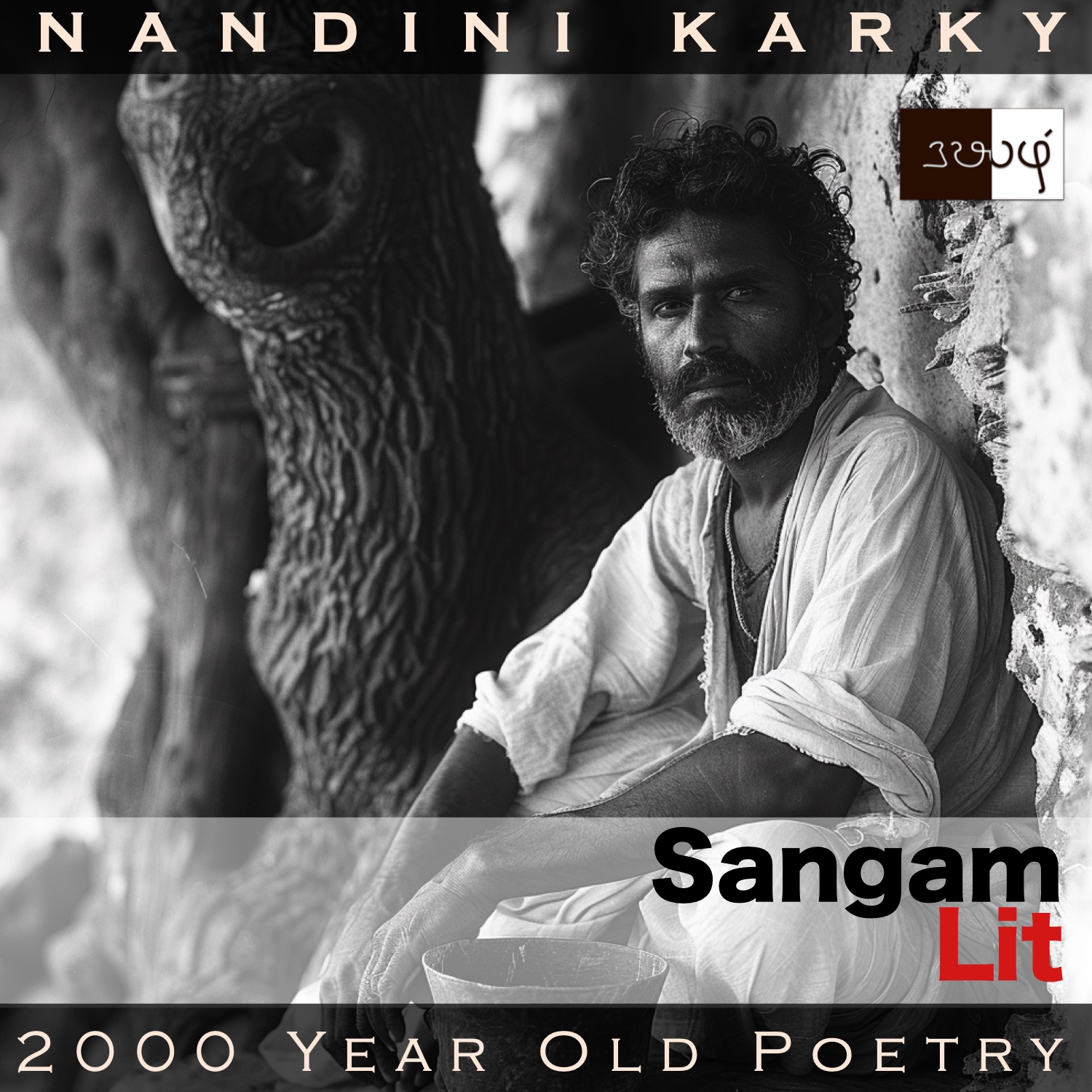Podcast: Play in new window | Download
Subscribe: Apple Podcasts | Spotify | Amazon Music | Android | iHeartRadio | Email | TuneIn | RSS | More
In this episode, we perceive the events of a battlefield, as depicted in Sangam Literary work, Puranaanooru 371, penned for the Pandya King Thalaiyaalankaanathu Cheruvendra Nedunchezhiyan by the poet Kallaadanaar. Set in the category of ‘Vaagai Thinai’ or ‘Victory’, the verse presents an impoverished poet’s perspective of a king’s conquest.

அகன் தலை வையத்துப் புரவலர்க் காணாது,
மரந்தலைச் சேர்ந்து, பட்டினி வைகி,
போது அவிழ் அலரி நாரின் தொடுத்து,
தயங்கு இரும் பித்தை பொலியச் சூடி,
பறையொடு தகைத்த கலப் பையென், முரவு வாய்
ஆடுறு குழிசி பாடு இன்று தூக்கி,
மன்ற வேம்பின் ஒண் பூ உறைப்ப,
குறை செயல் வேண்டா நசைய இருக்கையேன்,
அரிசி இன்மையின் ஆர் இடை நீந்தி,
கூர் வாய் இரும் படை நீரின் மிளிர்ப்ப,
வரு கணை வாளி……. அன்பு இன்று தலைஇ,
இரைமுரசு ஆர்க்கும் உரைசால் பாசறை,
வில் ஏர் உழவின் நின் நல் இசை உள்ளி,
குறைத் தலைப் படு பிணன் எதிர, போர்பு அழித்து,
யானை எருத்தின் வாள் மடல் ஓச்சி
அதரி திரித்த ஆள் உகு கடாவின்,
மதியத்து அன்ன என் விசி உறு தடாரி
அகன் கண் அதிர, ஆகுளி தொடாலின்,
பணை மருள் நெடுந் தாள், பல் பிணர்த் தடக் கை,
புகர்முக முகவைக்கு வந்திசின் பெரும!
களிற்றுக் கோட்டன்ன வால் எயிறு அழுத்தி,
விழுக்கொடு விரைஇய வெண் நிணச் சுவையினள்,
குடர்த் தலை மாலை சூடி, ‘உணத் தின
ஆனாப் பெரு வளம் செய்தோன் வானத்து
வயங்கு பல் மீனினும் வாழியர், பல’ என,
உரு கெழு பேய்மகள் அயர,
குருதித் துகள் ஆடிய களம் கிழவோயே!
I was struck by the similarity of structure between this verse and the previous one and yet there are some new elements to be discovered in this song on a poet’s journey to a battlefield. The poet’s words to this Pandya King can be translated as follows:
“Being unable to find any patron in this wide spreading world, I sat under the tree in the town centre, starving, weaving together fully blossomed flowers on a string, adorning my swaying, dark hair with that, a bag of ‘parai’ drums and other musical instruments by my side. Then, I gently took out my cooking pot with a broken mouth and placed it near me. Just then, the neem tree in the town centre shed its bright, white flowers beneath. Without wishing to do anything else, as the lack of rice tormented, I decided to traverse the hard-to-cross drylands path and come here.
Here, where a huge army of sharp-edged weapons swirl up and down as their forms dictate, and the arrows that shower… Where, thinking about how, without any compassion, as war drums echo aloud in the battlefield, you are famous for doing the ploughing with bows, and stacking corpses bereft of their heads in huge haystacks, using elephants as ploughing oxen, and swords as the palmyra fibres for threshing human heads in this wide battlefield.
Here, I came making the eye of my moon-like, well-tied ‘thadari’ drum quake, and beating upon my ‘akuli’ drum as well, seeking the gift of a huge elephant with legs like ‘panai’ drums, rough-textured long arm and spotted face, O lord!
Here, where, with white teeth akin to the tusks of elephants, she tastes the fat-mixed white flesh, adorns herself with a garland of intestines and this fear-evoking ghost maiden cries out saying, ‘The great one who rendered such a copious offering that ceases not even with endless eating, may he live for days much more than the shining stars’. I came here to this battlefield filled with the dust of dried blood that you are the conqueror of!”
Let’s delve into the details. The poet transports us to his ancient village as he sketches the context preceding his journey. He talks about the lack of patrons and how one day, as he was sitting under a tree, as hunger tortured him, he made a garland of the fallen flowers and wore it around his dark head. I smiled to think that even in the midst of that ravaging hunger, the poet is making an object of art and wanting to feel good about himself. Next, the poet glances at the many drums and assorted things he’s carrying and takes out his cooking pot with a chipped mouth. Just then, little white flowers of the neem tree fall down maybe on that empty cooking pot, and perhaps, this reminds the poet of rice and how it’s nowhere to be found. Without having the desire or energy to do anything else but find food, the poet then decides to cross the harsh drylands and come to the battlefield, where this Pandya king is threshing human heads with his army of elephants and swords, and leaving haystacks of headless corpses.
The poet then talks about how he came there playing on two of his drums, the ‘thadari’ and ‘akuli’, singing praises of this victorious king and wishing that he grants him at least a huge elephant as his gift. He then goes on to present the events of the battlefield from the point of view of a ghost maiden, most probably a creature of fantasy, invented to symbolise death. The poet paints a portrait of these ghost maiden biting into the many corpses with their sharp tusk-like teeth, and wearing a garland of intestines around their necks. Horrific images of these ladies, indeed! The poet then remarks how they are feeding on all the flesh and fat and declaring that this king who is offering them such an unending feast must live for more days than there are stars in the sky. He ends with a finishing touch declaring that this king was the sole conqueror on that fear-evoking battlefield where particles of dried-up-blood filled the air! Yet another blend of a poet’s suffering-filled present and a king’s gory conquest. The way the poet takes us within his situation, his mind and his decision to conquer his suffering is what makes this verse noteworthy!




Share your thoughts...